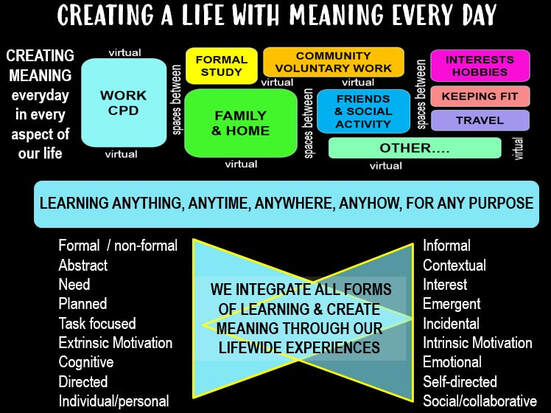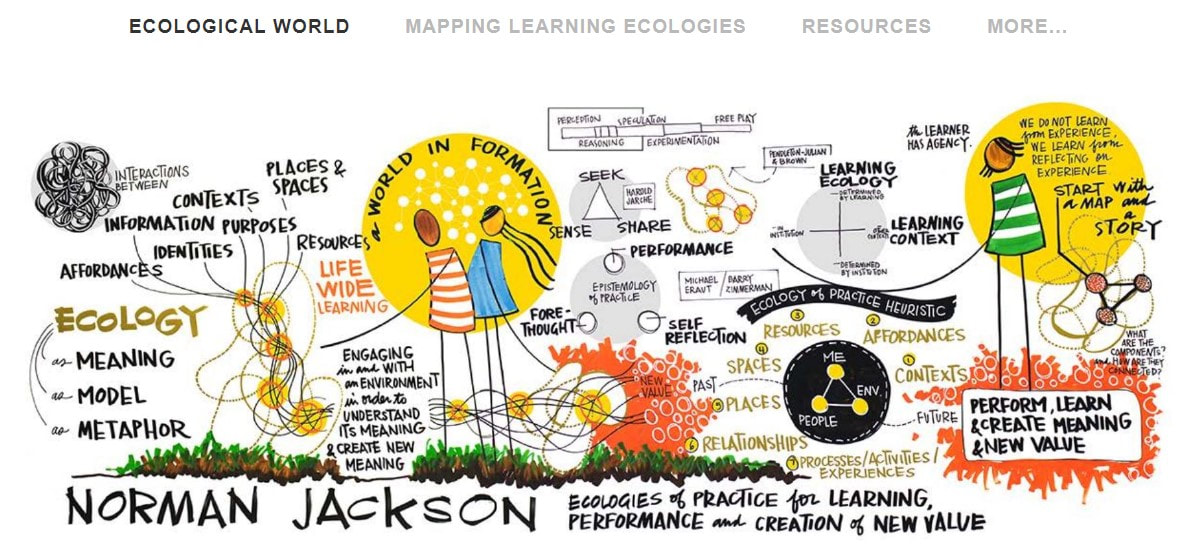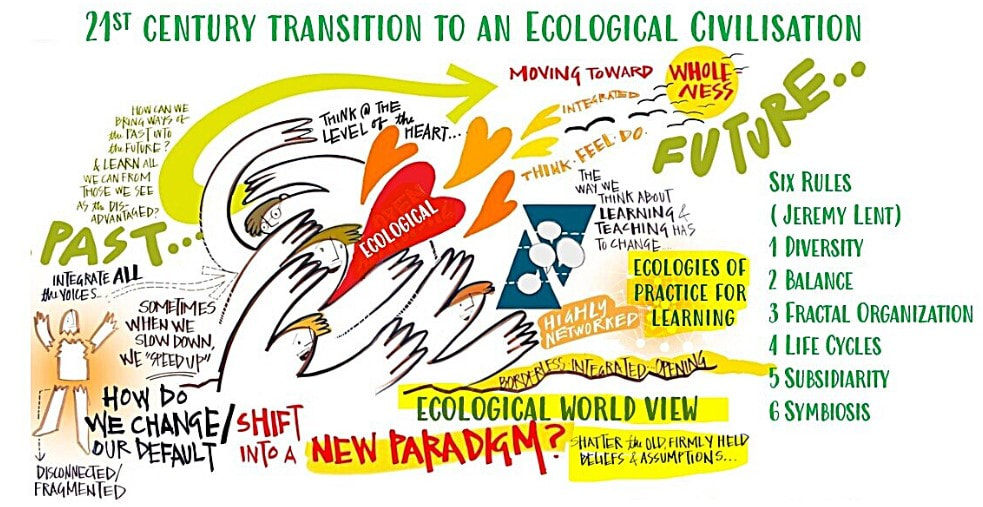The International Lillehammer Lifelong Learning ICDE Conference being held on15-17 February 2023 in Norway is one of the most important conferences for educational practitioners, scholars and policiy makers interested and involved in adult lifelong learning. The conference is hosted by Inland Norway University of Applied Sciences in collaboration with the International Council for Open and Distance Education (ICDE). It has many partners representing unions, confederations, employers, and governmental and transnational organisations including ILO, UNESCO, EADTU, EPALE, Commonwealth of learning (see the Conference Website).
Integrating Learning and Living
Creating a Life with Meaning: A lifewide-ecological concept of lifelong learning
Professor Norman Jackson (Founder Lifewide Education) Available Feb 15th 2023
PRESENTATION NARRATIVE
Creating a Life with Meaning: A lifewide-ecological concept of lifelong learning
Professor Norman Jackson (Founder Lifewide Education) Available Feb 15th 2023
PRESENTATION NARRATIVE
|
| |||||||||||||

ABSTRACT
Creating a Life with Meaning: A lifewide-ecological concept of lifelong learning
Learning, connected to action, is an essential aspect of our competence as an organism to interact effectively with our environment (1). Such an understanding draws attention to the fundamentally ecological nature of our existence in the sense that we are beings enacting life within and with an ecological world of relationships, connectivity, interdependencies and transformations. Each interaction creates experiences and our engagement with such experiences leads to the creation of meaning (2). In this way, we and our world are in continuous, reciprocal formation and our lifelong learning is no more or less than our continual undergoing (3) as we participate in and experience the world and contribute, in small but meaningful ways, to its formation. By joining up the dots of our life we weave our stories into a narrative to create the meaning that is our life.
The nature of our ecological being is revealed in the lifewide dimension of everyday life as we participate in many different contexts and environments more or less simultaneously (4). For example, in a single day we might inhabit and perform in environments and contexts relating to work or self-study, home and family, and participate in social activities with friends or with members of our local community. We might go shopping or go for a walk, travel on public transport or by car, exercise, do a job in our house or garden and spend time for any number of reasons, interacting with people or content in the virtual spaces we access through our smart phones, computers or other devices. These and many other forms of participation in life require awareness and competency that has been learnt and they all involve situations in which new learning and competence can emerge.
Through our lifewide activity and experiences we create a life with meaning as we try to satisfy our psychological, physical, material and social aneeds. Our most fundamental need is to sustain our existence – our need for food, shelter, to feel secure, have economic independency and keep fit and healthy. Beyond this we need relationships that give us purpose, love, friendship, feelings of belonging and a sense of who we are. Then there are needs that relate to our own growth and achievement and to how we might contribute to a world and a future beyond ourselves (5,6,7). As we interact purposefully with the world that has meaning to us, we weave together aspects of ourselves and our environment, in an ecology of practice in which learning, the making of meaning and other achievements are embedded (8). By recognising that our learning and practice underpin our ecological being, we are laying the foundations for a future based on ecological principles and values (9) - an important step in the transition to a new Ecological Civilisation (10,11).
Sources
1 White, R. W. (1959). Motivation reconsidered: the concept of competence. Psychological Review, 66, 279–333.
2 Lemke, J. (2000) Across the Scales of Time: Artifacts, Activities, and Meanings in Ecosocial Systems. Mind, Culture and Activity 7 (4), 273–290 available on-line at http://www.jaylemke.com/storage/Scales-of-time-MCA2000.pdf
3 Dewey, J. (1916), (2007 edition) Democracy and Education, Teddington: Echo Library
4 Jackson, N. J. (2011) The lifelong and lifewide dimensions of living, learning and developing. In N J Jackson (Ed) Learning for a Complex World: A Lifewide Concept of Learning, Education and Personal Development. Bloomington: Authorhouse. p.1-21 Availabe at: https://www.lifewideeducation.uk/learning-for-a-complex-world.html
5 Maslow, A. H. (1943). A theory of human motivation. Psychological Review, 50(4), 370-96
6 Alderfer, C.P. (1969) An Empirical Test of a New Theory of Human Needs. Organizational Behavior and Human Performance, 4, 142-175.
7 Robbins T. (undated ) Discover the 6 Human Needs. Blog Post Available at:
https://www.tonyrobbins.com/mind-meaning/do-you-need-to-feel-significant/
8 Jackson N. J. (2016/19) Exploring Learning Ecologies Betchworth: Chalk Mountain. Available at https://www.lifewideeducation.uk/exploring-learning-ecologies.html
9 Jackson, N.J. (2022) Steps To An Ecology of Lifelong-Lifewide Learning for Sustainable, Regenerative Futures In K. Evans, Lee, W.O. Markowitsch, J. & Zukas M. (Eds) Third International Handbook of Lifelong Learning Springer Available at https://link.springer.com/referenceworkentry/10.1007/978-3-030-67930-9_15-
10 Lent, J. (2021). What Does An Ecological Civilization Look Like? YES Magazine Spring 2021 Available at: https://www.yesmagazine.org/issue/ecological-civilization/2021/02/16/what-does-ecological-civilization-look-like
11 Lent, J. (2022) The Web of Meaning London: Profile Books



